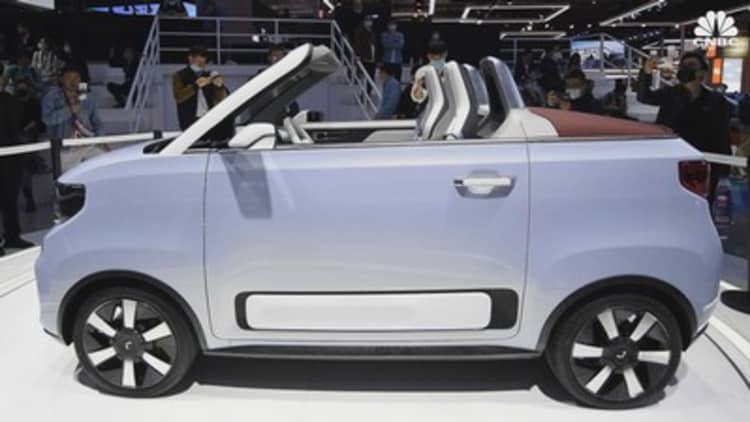Xiaomi delivers record cars in March as winners emerge in China EV race
A Xiaomi store in Shanghai, China, on March 16, 2025.
Qilai Shen/Bloomberg | Bloomberg | Getty Images
Chinese electric carmakers Xiaomi, Xpeng and Leapmotor each delivered nearly 30,000 or more cars in March, roughly twice several of their fellow startup competitors.
It’s a sign of how some automakers are pulling ahead, while BYD remains the market leader by far.
Xiaomi delivered a record number of electric vehicles in March, exceeding 29,000 units, the company announced on social media. That topped its prior run of delivering more than 20,000 vehicles in each of the past five months.
The SU7, Xiaomi’s flagship model, was involved in a crash on a highway on Tuesday that left three dead. The automaker on Tuesday afternoon released a statement on Chinese social media that the vehicle was in navigation on autopilot mode before the accident.
Based on preliminary information, the road was obstructed because of construction. The driver took control of the car but collided with construction infrastructure. Xiaomi added in the release that investigations were underway.
That came two weeks after the automaker announced on March 18 its goal to deliver 350,000 vehicles this year. There are also talks of the automaker expanding its second EV factory in Beijing to meet demand, Bloomberg reported on March 18. Xiaomi did not immediately respond to CNBC’s request for comment.
Its competitor Xpeng in March delivered 33,205 vehicles, the fifth consecutive month it has delivered over 30,000 units per month and reflecting a 268% surge in deliveries from the same month last year. March is also the fifth consecutive month the company has delivered over 15,000 units of the Mona M03.
Leapmotor delivered 37,095 vehicles, reflecting a 154% year-over-year growth. The Stellantis-owned automaker last month launched U.K. sales of two electric vehicle models, the T03 and the C10.
Li Auto delivered 36,674 vehicles in March, a 26.5% year-over-year increase, but fewer than every month in the second half of 2024. The company’s cars had gained early traction with Chinese consumers since most come with a fuel tank for charging the vehicle’s battery, reducing anxiety about driving range.

BYD sold 371,419 passenger vehicles in March, reflecting a year-over-year growth of 57.9%. Its overseas sales volume also hit a record high of 72,723 units in March.
In the same month, the automaker unveiled its “Super e-Platform” technology, which boasts 400 kilometers (roughly 249 miles) of range with five minutes of charging. The company in February also announced that it was integrating DeepSeek artificial intelligence to develop “DiPilot,” its advanced driver-assistance system.
Across the board, major companies across China’s electric car industry reported deliveries rose last month, indicating a pick-up in demand from the seasonally soft first two months of the year.
U.S. automaker Tesla sold 78,828 electric vehicles in China in March, marking a 11.5% year-over-year decline in growth.
Other Chinese…
Read More: Xiaomi delivers record cars in March as winners emerge in China EV race
